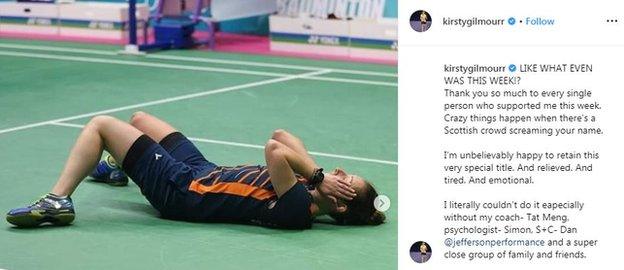Kirsty Gilmour: Olympic badminton player on social media, pressure & women's sport
- Published
Badminton star Kirsty Gilmour on serving into toilet roll & shuttlecock keepy-ups
Some days, Kirsty Gilmour doesn't want to feel special. Some days she could do without the expectation and pressure that comes with being an Olympian. With being a role model.
The double Commonwealth Games badminton medallist considers it "amazing and a real compliment, but difficult" to be on that pedestal.
But then, she sees pictures on Instagram of people dressing up as her. She has parents saying how much their kids cherished her going to their schools to "turn up and speak about my job".
"You don't realise the impact you have on people just from hitting a shuttlecock around," she says. "Not many people can see others so invested in their careers and that is where social media is amazing."
'I come off social media during tournaments'
For Gilmour, social media can be both blessing and curse, though. There is the pressure on athletes from sponsors and fans to maintain their own accounts. Praise and criticism from the public. Distractions everywhere and triggers for all sorts of thoughts and notions.
"There's a level of attention that athletes wouldn't have had 20 years ago," Gilmour says. "It's like a vacuum and we don't have an infrastructure to help athletes with yet as it's still a new thing. Things need to evolve in line with it to help people cope with the pressure and expectation that comes externally, rather than just from within athletes themselves."

Gilmour thinks back to the home Commonwealth Games in Glasgow in 2014. She was 20, and had won her semi-final to secure at least a silver medal and would play for gold the next day.
"There was a party at Commonwealth House that some of the other athletes were at because they'd finished competing," she recalls. "I lay in bed reading all these tweets about how amazing I was and it made me feel really, really good about being part of it.
"But it took some of the edge off my desire the next day because I thought 'Oh I'm already really good and I have a silver medal'. It was the first major competition I'd been in and I was a bit naive."
Now older and wiser, Gilmour - who won Commonwealth bronze in 2018 - comes off social media altogether during major "high-pressure" events. "It takes away that mindless scrolling, comments you wish you had never read. Even the nice ones praising your performance because it's a stimulus and puts other people's ideas in your head."
Gilmour has decided not to let herself become stressed by the relentless pursuit of ranking points from tournament to tournament, opting instead to enjoy playing the spot.
"The best way I can describe life as a professional athlete is constantly feeling like you've got an exam coming up," she says, trying to explain the rhythm of going from preparing to competing. "I have a tournament every two or three weeks and you treat that as a test of your ability. That's been the last seven or eight years of my life."
Over those years, Gilmour has found valves to release that pressure, be it talking to a sports psychologist or just chatting with friends and family who "don't want to hear about badminton and really don't care" about it. "That's the best because we can sit and talk about Game of Thrones or Avengers," she says.
'There has to be repeated coverage of female athletes'
Andy Murray corrects journalist over gender claim
Her friends might not care, but Gilmour is at the vanguard of a crop of female Scottish athletes making an impression on the international stage. Be it Laura Muir on the track, Elise Christie or Eve Muirhead on the ice, Katie Archibald on her bike, or the women's football team on the pitch, there are a raft of role models for young Scottish girls to idolise.
Gilmour is encouraged by the increased coverage being to female athletes, but says the distance travelled of late is "miniscule compared to how far we have to go".
"There has to be coverage from the media to recognise names and faces - if you don't know them you're not going to get involved following them," she says. "They need to be reported on again and again so there's emotional investment from people. It would be nice to get to a place where we don't have to call it 'female sport' - it's just sport whether it's football, badminton, tennis.
"I train with men and there's still some elements of the women's game that are better than the men's game. Male sport can learn from female and female from male - it's a two-way street. Look at Andy Murray choosing to work with Amelie Mauresmo. He's an absolute legend in terms of calling out those little things slipping out of people's mouths and more people are now maybe thinking 'Oh we probably shouldn't say that'."